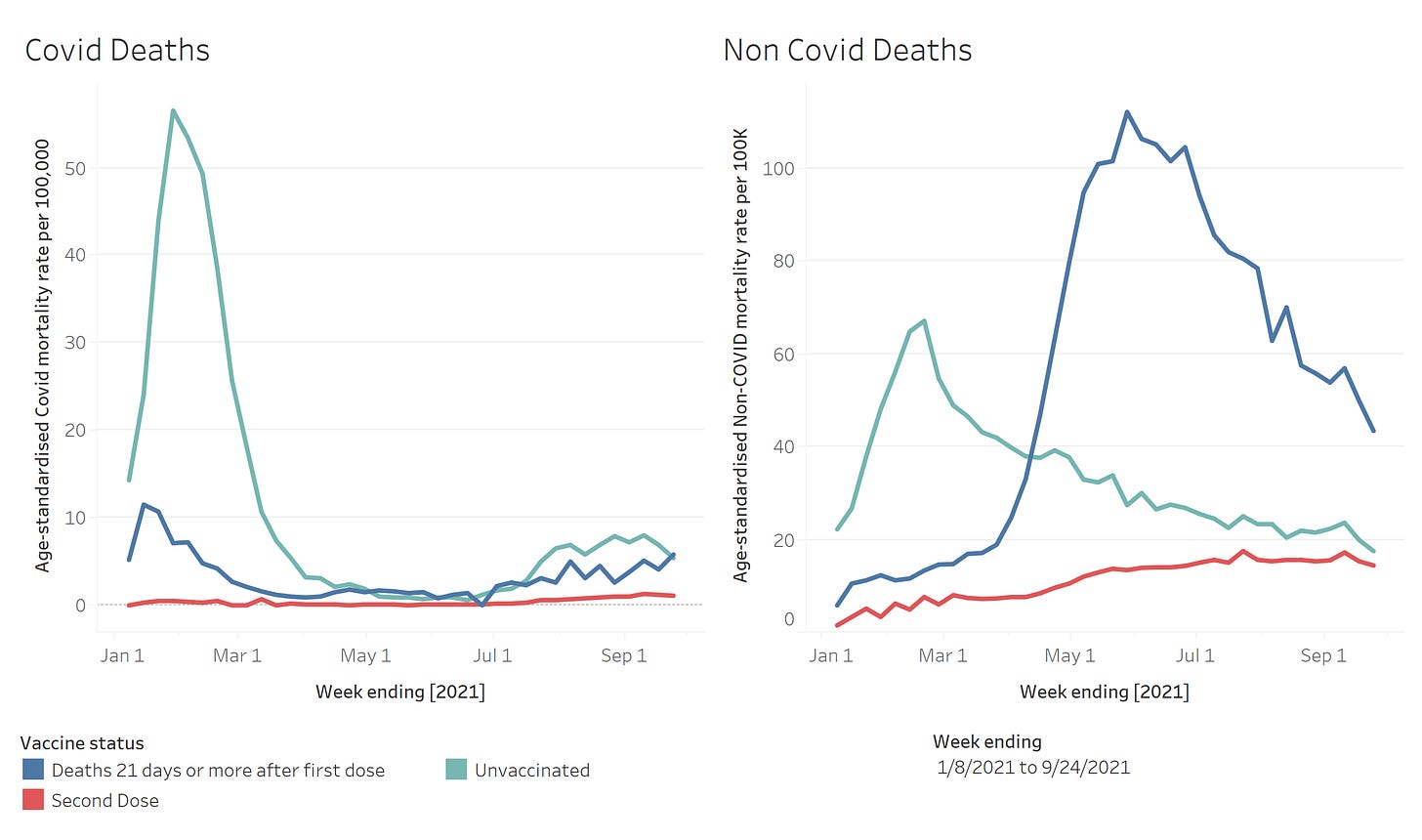My last post was critical of an Alex Berenson post that used all-cause mortality data in what I (and many others) thought was a very misleading way. Alex had a follow up today in which, in my opinion, he failed to substantively address the criticisms. Nevertheless, he did bring up a good point that is worth discussion and investigation.
Namely, how similar are the various vax status groups in terms of overall health. We have seen, for example, with the flu that what might appear at 1st glance to be evidence of the effectiveness of the flu vaccine is actually mostly reflecting the fact that the people who get the flu vaccine are healthier than those that do not. This subject is discussed well by @m_soond in this post . Could the same be true of the COVID vaccine? Are the people receiving the vaccine in general healthier than those not getting vaccinated? Alex offers some logical reasons this may be and some anecdotes, but I’d like to investigate with data.
To do this, I am going to use the same UK data that includes all-cause deaths and covid deaths by vaccination status. I will look at the age-standardised data. I will make one simple calculation to this data: subtract the Covid Age-Standardised deaths from the All Cause Age-Standardised deaths to result in Non-Covid Age-Standardised deaths. In this plot, on the left we have the Covid deaths and on the right is the Non-Covid deaths:
I have not included the “<21 days after first dose” group because that is by nature a small, transitory group, and the data seems quite noisy.
21 days or more after first dose group:
Since April or so, we can see on the right that the folks >21 days past first dose, but without a second dose have by far the most non-Covid deaths. This would make sense if these are folks who had bad reactions to the 1st dose, or who were progressively getting more sick/frail and a 2nd dose was not worth the risk. Note, this is not saying these folks are older, the above is already adjusted for age. The above is not adjusted for health however, so we are saying these are folks of worse health, at the same age, as other groups.
Unvaccinated group:
We see the huge spike in Covid deaths among the unvaccinated at the beginning of the year, but we also had a large spike in non-Covid deaths during approximately the same time. Perhaps during those months the unvaccinated were a pretty unhealthy group? In addition, although the gap is shrinking over time, the Unvaccinated group consistently has more age-adjusted non-Covid deaths than the fully vaccinated (right chart). I know of no reason that a Covid vaccine would reduce your chances of dying of something other than Covid, therefore the logical conclusion is that the full vaccinated are a generally healthier group than the unvaccinated. If the groups were equally healthy, we would expect non-Covid deaths between the two to be essentially identical.
The implication of this would be that when we go back to looking at Covid deaths and the vaccine effectiveness in preventing hospitalizations and deaths, we are likely overstating the VE. Some of the improved results are simply because the vaccinated are healthier in general and have nothing to do with the vaccine. Quantifying how much requires more thought on my side. Hopefully a decent approximation can be made in a future post.





hi! and thank you for your work.
you say «i know of no reason that a Covid vaccine would reduce your chances of dying of something other than Covid, therefore the logical conclusion is that the full vaccinated are a generally healthier group than the unvaccinated.».
but i believe the lower mortality in the full vaxed is a result of the mortality increase between the 1st and 2nd dose, which serves as a kind of culling.
i've read it's called a 'dry tinder' effect.
Mathew Crawford attributes the unusual health of the fully-vaccinated group to survivorship bias and the 'dry tinder' effect, as mentioned by another commenter. If vaccination weeds out susceptible individuals by the same types of mechanisms that Covid causes deaths wouldn't the doubly-vaccinated population tend to be more robust, at least initially?